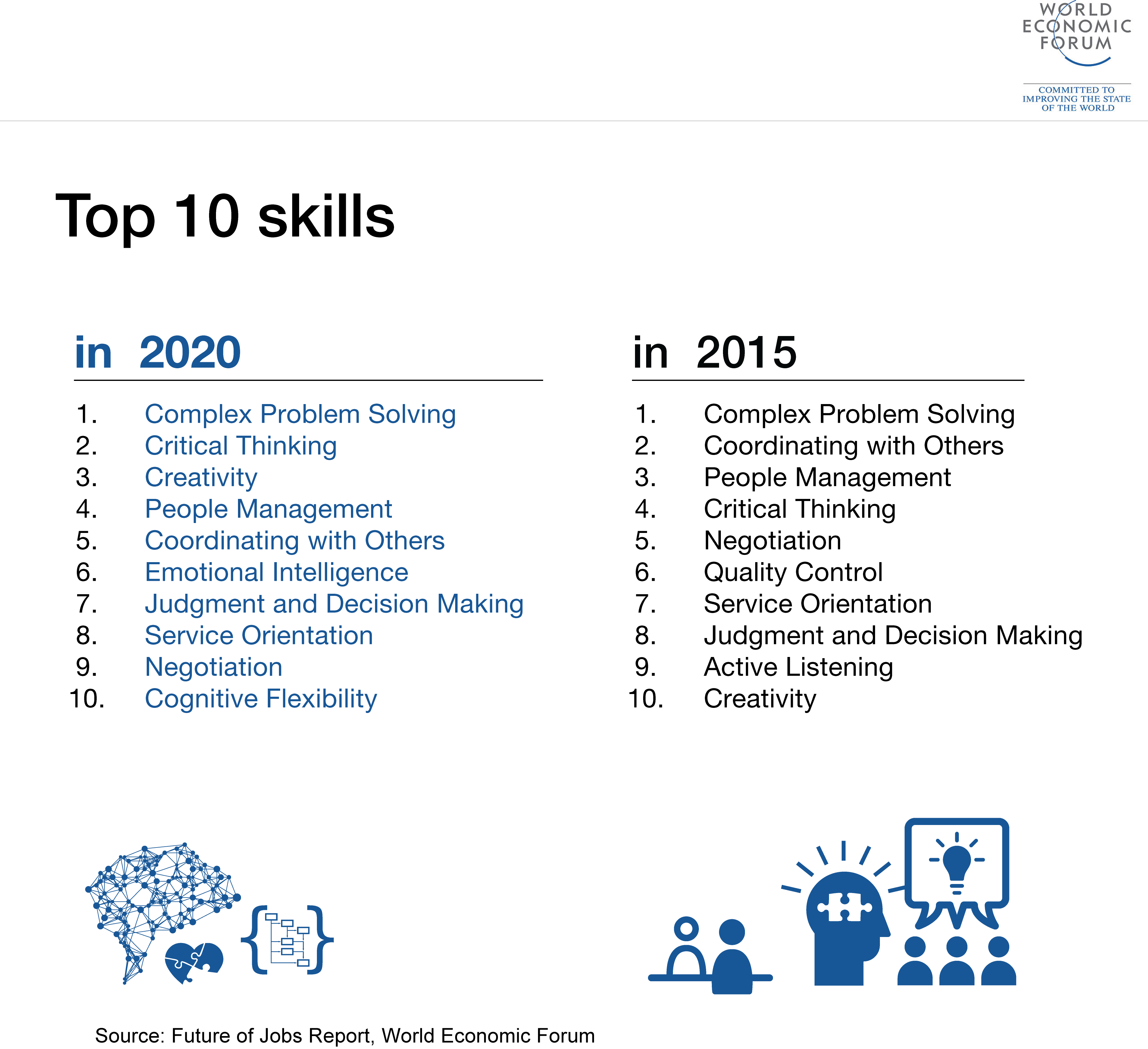11 experts at Davos on the future of work

Two-thirds of the jobs lost will be in white-collar office functions, says the World Economic Forum Image: REUTERS/Robert Galbraith

Get involved with our crowdsourced digital platform to deliver impact at scale
Stay up to date:
Future of Work
Nowhere will the impact of the Fourth Industrial Revolution be felt more than in the world of work. It was a hot topic for discussion at this year’s World Economic Forum in Davos. Here’s our line-up of what the experts are saying about it.
1. “The current system feels broken,” said Jonas Prising, CEO of ManpowerGroup, discussing the state of the labour market. “We see high unemployment with unfilled jobs, rising productivity with stagnant wages, and economic recovery with declining upward mobility.”
“Sixty percent of people now live in countries with stagnant or shrinking workforces,” he said.

2. Meanwhile, “many members of the global workforce can’t keep up with the shift in skills required for jobs”, according to Allen Blue, Vice-President of Product Management and Co-Founder at LinkedIn.
On average, by 2020, more than a third of the desired core skill sets of most occupations will be comprised of skills that are not yet considered crucial to the job today, according to The Future of Jobs report by the World Economic Forum.
However, “the best way to navigate the rapid change in supply and demand of skills is to describe each job as an agglomeration of skill,” says Blue. “The increasing availability of data about labour supply and demand, and the economy more broadly, can help policy-makers, employers, educators and members of the workforce react quickly and effectively to changes in demand for skills, and collectively increase economic opportunity worldwide.”
3. “The emphasis needs to be placed on skills,” said Satya Nadella, CEO of Microsoft, at the panel session the Transformation of Tomorrow. “We will have to spend the money to educate our people – not just the children, but also people getting misplaced mid-career – so that they can find new jobs.”

Employers will need to embrace a new way of working
4. “Currently, only 53% of chief human resource officers surveyed are reasonably or highly confident regarding the adequacy of their organization’s future workforce strategy to prepare for the shifts ahead,” explained Saadia Zahidi and Till Leopold from the World Economic Forum. In order to succeed, “businesses will need to put talent development and future workforce strategy front and centre to their growth”.
5. That strategy includes increased mobility, explains Alain Dehaze, CEO of Adecco Group: “Mobility no longer means merely traditional expatriate placements, but moving jobs to where talented people are located,” he said. “Mobilizing talent … is as much part of the Fourth Industrial Revolution … as water and steam were in the first,” he added.
“For regulators and governments, structural reforms to remove barriers and bureaucracy and the simplification of labour markets remain paramount,” he said.
What will jobs look like?
“Any kind of job is going to have a digital component,” stated Satya Nadella. “It doesn’t mean everyone’s got to be a computer scientist; digital technology can in fact bring skills to a much more under-skilled population because of their ease of use and the ease of access to technology.”
“Technology can help more people and more broadly than any other industrial revolution,” he added.
6. “With tech enablement, employment will no longer be the dominant model or the singular model through which companies get work done,” said Ravin Jesuthasan, Managing Director of Willis Towers Watson. “The winning organizations of tomorrow will be the ones who have a business model that allows to seamlessly traverse all the options and continually move work in a way that best meets their needs.”
7. “We see job opportunities in the freelance and gig economies that you wouldn’t have been able to see 15-20 years ago,” said Sara Sutton Fell, Founder/CEO of @FlexJobs. “Anything from marketing to executive roles, to medical. Tied to that is also the globalization and equalization of opportunities that that kind of workforce can allow.”
Job gains and job losses
8. Jobs gains in the next five years will not be enough to offset expected losses, said Saadia Zahidi and Till Leopold.
Two-thirds of the jobs lost will be in white-collar office functions, such as administration: roles that will be taken over by machines. Job gains won’t be evenly spread. Rather, areas of science, technology, engineering and maths will see the majority of new roles created: competition for talent in high-growth areas such as computing, mathematics, architecture and engineering, and other strategic and specialist roles, will be fierce.”
“If you are choosing your college degree today, STEM skills are a good bet,” they say.
There is no doubt that the Fourth Industrial Revolution presents a challenge of displacement, that of technology taking jobs away from people,” agreed Satya Nadella. “Jobs are going to change, the nature of work is going to fundamentally change; it happened in the second and third industrial revolutions. I’m sure the same debate was had and we somehow figured it out.”
9. Let’s not forget, though, said Sheryl Sandberg, COO of Facebook: “Yes, tech creates huge disruption but it’s also the case that tech powers things in the non-tech centre and very much in the entrepreneurship space."
10. “This revolution will produce winners and losers. Our job is reduce the number of losers,” added Paul Kagame, President of the Republic of Rwanda.
The benefits of technology in the developing world
“Technology has become a huge multiplier, affecting growth and development and connecting people,” said Kagame. “Even for the poorest people, having some simple technologies has improved their lives; very ordinary people are understanding the importance of technology. In the last 10 years in Rwanda, it’s just continued progress, and most of it contributed to by the use of technology.”
“Connectivity and data access are too important to keep only to the world’s rich,” said Sheryl Sandberg. “There are 4 billion people in the world who don’t have access; when they do get access they are more highly educated, they have job opportunities and longer, healthier, more productive lives. It doesn’t just benefit us; we get the benefit of their ideas.”
11. “You can put 3D printers in the villages, you can link them up to customers, you can cut out the intermediaries they needed to get to city markets,” explained Anand Mahindra, Chairman and Managing Director of Mahindra & Mahindra Ltd, talking about the effect of technology in India. “Gandhi and Schumacher talked about “small is beautiful”, villages that are self-sufficient. The Fourth Industrial Revolution was the missing link; if they had that technology they could have made that vision come alive”
With the idea of technology in general in mind, he concludes: “I’m sorry but I can’t resist the temptation of a Star Wars analogy, but you know "the Force" can be misused or used. If it’s used for the good you’re a Jedi, if it’s used for the bad you’re a Sith, a Member of the Empire. I think the choice is: do we want to be Jedis or do we want to be Siths?”
The Annual Meeting took place in Davos from 20 to 23 January 2016, under the theme Mastering the Fourth Industrial Revolution.
Don't miss any update on this topic
Create a free account and access your personalized content collection with our latest publications and analyses.
License and Republishing
World Economic Forum articles may be republished in accordance with the Creative Commons Attribution-NonCommercial-NoDerivatives 4.0 International Public License, and in accordance with our Terms of Use.
The views expressed in this article are those of the author alone and not the World Economic Forum.
The Agenda Weekly
A weekly update of the most important issues driving the global agenda
You can unsubscribe at any time using the link in our emails. For more details, review our privacy policy.
More on Future of WorkSee all
Andrea Willige
February 29, 2024
Kara Baskin
February 22, 2024
Stephen Hall and Rebecca Geldard
February 19, 2024
Jason Walker and Deborah Circo
February 12, 2024






